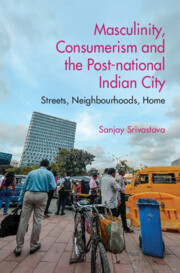Book contents
- Frontmatter
- Dedication
- Contents
- List of Figures
- Acknowledgements
- 1 Introduction: Masculinity, Modernity, Urbanity
- 2 Nationalism, Masculinity and the City
- 3 Dislocated Masculinities and the Unofficial City
- 4 Thrilling Affects: Sexuality, Masculinity, the City and ‘Indian Traditions’ in the Contemporary Hindi ‘Detective’ Novel
- 5 Fragmentary Pleasures: Masculinity, Urban Spaces and the Commodity Politics of ‘Religious Fundamentalists’
- 6 Technotopias: Masculinity, Women, the City and the Post-national Condition
- 7 Conclusion: Masculine Body Politics
- Bibliography
- Index
2 - Nationalism, Masculinity and the City
Published online by Cambridge University Press: 06 September 2022
- Frontmatter
- Dedication
- Contents
- List of Figures
- Acknowledgements
- 1 Introduction: Masculinity, Modernity, Urbanity
- 2 Nationalism, Masculinity and the City
- 3 Dislocated Masculinities and the Unofficial City
- 4 Thrilling Affects: Sexuality, Masculinity, the City and ‘Indian Traditions’ in the Contemporary Hindi ‘Detective’ Novel
- 5 Fragmentary Pleasures: Masculinity, Urban Spaces and the Commodity Politics of ‘Religious Fundamentalists’
- 6 Technotopias: Masculinity, Women, the City and the Post-national Condition
- 7 Conclusion: Masculine Body Politics
- Bibliography
- Index
Summary
Introduction
This chapter explores the imagination of the city as a site of elite masculine identity at the turn of the twentieth century. The broader aim of the chapter, and the key reason why it inaugurates the book, is to suggest that, notwithstanding the overwhelming focus on the village as a site of a nationalist fashioning of ‘authentic’ India, there was also an important strand of modern Indian thinking that saw the city as a site of post-colonial futures. Further, the present discussion is a necessary background to a fuller discussion of the notion of post-nationalism – outlined in the previous chapter – that forms the key conceptual framework that sutures the discussion of the book. To move beyond a ‘national’ framework of analysis, it is important to first deal with it. This chapter explores the different ways – materially and symbolically – in which city-ness constituted a significant aspect of the nationalist imaginary and the making of class identities in the early twentieth century. The discussion moves between historical analysis and ethnographic vignettes to explore metropolitanism both as a system of thought and a structure of feeling.
The focus of the discussion is the Doon School, an elite residential school for boys in the north Indian city of Dehradun in the state of Uttarakhand. The moving spirit behind the School, founded in 1935, was Satish Ranjan Das, Law Member of the Viceroy's Executive Council, sometime treasurer of the Boy Scouts of Bengal and the Lodge of Good Fellowship, and a prominent member of the reformist Brahmo Samaj that originated in Bengal. The School has been a historically significant site for the production of elite discourses on modernity and citizenship. It was to be the site where, as Das wrote to one of his sons in 1927, ‘the problem of the nationality of Indians’ (Singh 1985: 11) would find its resolution and a place where they would learn to be citizens and come to grips with the demands of modernity.
This chapter is concerned with thinking about the School as a significant site for the construction of narrative of the metropolis – and modernity – through its discourse that made urban life stand for ‘civilised’ post-colonial existence.
- Type
- Chapter
- Information
- Masculinity, Consumerism and the Post-National Indian CityStreets, Neighbourhoods, Home, pp. 37 - 59Publisher: Cambridge University PressPrint publication year: 2023



